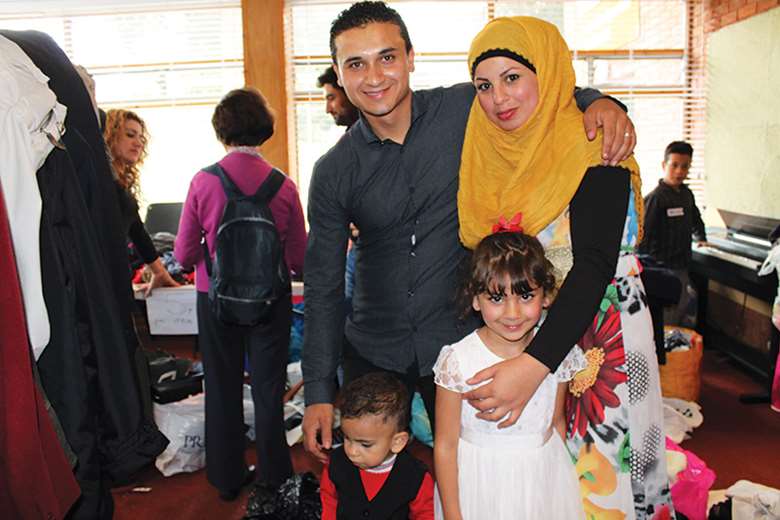Resettling Syrian child refugees
Pip Tyler
Tuesday, October 31, 2017
New guide offers advice on how councils can help Syrian refugee families successfully adjust to UK life.

In September 2015, the UK government committed to resettle in the UK by 2020 up to 20,000 refugees from war-torn Syria through the Vulnerable Persons Resettlement Scheme (VPRS).
So far, 8,535 people have been granted protection under the VPRS. Latest Home Office data shows that between July 2016 and June 2017, 5,637 people were resettled in 246 council areas - 2,872 of whom were children.
Up to now, local authorities have focused on securing homes, school places, language classes and health care for people being resettled under the scheme. It's easy to focus on the numbers of arrivals as markers of progress, but it's much more difficult to know you're heading in the right direction when it comes to longer-term goals of "integration" and "independence".
Every council must now be thinking about how it will meet the specific needs of Syrian children and young people as they adjust to life in the UK.
Well resourced
The VPRS is the best resourced refugee scheme in the UK. In contrast to the National Transfer Scheme for unaccompanied asylum-seeking children, where support costs are only partially reimbursed through the Home Office, the VPRS offers financial support during the first five years of a refugee's stay in the UK.
Councils can claim for support costs according to a per person tariff: in a person's second year in the UK this is £5,000, reducing each year to £1,000 in the fifth year. There are certain expectations around what support should be provided, such as language training and employment support, which are outlined in Home Office guidance.
New guide
Resettling Refugees: Support After the First Year is a new guide commissioned by the Local Government Association (LGA) that outlines the changing needs of resettled people and the areas of work that councils might develop to support Syrian refugee families once they have been here for a year.
It explores the range of issues that local authority staff will be focusing on such as casework support, community involvement, language, education and employment support.
For example, if schools are struggling to support new arrivals, VPRS funding could be used to provide classroom assistance, language and special educational needs support to keep refugee children in the classroom with their peers, or offer additional provision through the summer.
Councils may want to provide a casework support system to help families apply for school places as their children transition from one educational setting to another.
Additional funding has been provided for the scheme to cover childcare costs so that refugee parents can attend language classes, leading to a multitude of benefits for the whole family.
Young refugees
Older child refugees face particular challenges. Not only do they have to catch up in their schooling to be able to compete with their peers, they also might be taking a more adult role at home. Children are likely to develop greater fluency in English than their parents, and can end up acting as translator, interpreter and go-between when their parents are trying to access services, which can involve distressing stories.
The VPRS funding could be used to facilitate access to social opportunities for more isolated young people to meet peers through sport or leisure activities. It can also be used to support young people who have just left the education system but have no work experience to find work and training opportunities, such as language-for-work courses (see case study) or the purchase of IT equipment to be able to search for jobs online themselves.
Through participating in the VCRS, councils have the opportunity to step up and think through the best ways in which they can provide long-term support.
CASE STUDY: LANGUAGE SUPPORT NEEDS IN YORKSHIRE
Focus groups and interviews were conducted with resettled Syrians in the Yorkshire and Humber region to understand needs and the barriers faced in accessing language support.
Clients explained that learning English was important for communicating with schools, helping children with homework, speaking to new friends in English, going to the shops and finding work.
They said key barriers to accessing English for Speakers of Other Languages (ESOL) such as geographical isolation, inadequate provision, lack of classes to fit around school and childcare commitments, and health issues restricting participation.
In addition, the focus groups highlighted some less well-known issues. For example, people unable to access class-based learning, such as women in late stages of pregnancy and with newborns or those with complex health needs.
Identifying the multiple barriers to accessing ESOL faced by refugees has enabled local authorities to look at using VPRS resources to tailor the types and availability of ESOL more precisely.
- Pip Tyler is policy and research manager, Migration Yorkshire and co-author of Resettling Refugees: Support After the First Year
Further reading
Unaccompanied asylum-seeking children - briefing, Migration Yorkshire, 2017
Syrian Refugee Resettlement: a guide for local authorities, LGA, 2016
Migrant Youth. #13 in the Introduction to Migration Series, Migration Yorkshire, July 2016




